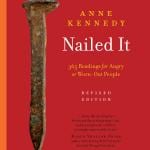Well, this is cheery. Apparently the worst age is 48—in every culture, regardless of life-expectancy, personality, or social situation, even for chimpanzees:
Mr Blanchflower, 68, is now an economics professor in America, teaching at Dartmouth College in Hanover, New Hampshire. The survey looked at data from 500,000 people in 145 countries. Respondents were asked: “Overall, how satisfied are you with your life nowadays?” Those in their late forties gave the most negative replies. Professor Blanchflower said he was surprised to find that the results held true for richer and poorer countries, as well as those with longer and shorter life expectancies. He said: “You would have thought in cases where life expectancy is much lower . . . if you look at countries in the bottom 20 and top 20 it is true in all of them. “In a way, it’s something deep in the genes. The fact I see it in every developed country, every member of the European Union. All these developing countries have it. Even monkeys have it. There is something deeply natural going on.” The existence of a mid-life crisis among great apes was discovered in a 2012 study published in the journal Proceedings of the National Academy of Sciences of the United States of America. The study of 508 apes involved people familiar with the individual animals, which consisted of chimpanzees and orangutans, assessing their ward’s wellbeing at different ages. The reason for the mid-life dip in happiness remains unclear. Professor Blanchflower said, however, that family structures and people becoming more realistic about what is achievable in life could have some affect.
Yeah, that could definitely be it. Just a little. Reality is a real pain in the neck, I think. That and this (from the article):
“When you have children, toddlers make you really happy but adult children are a problem.”
I had no idea– adult children are a problem! I would have said that people, in general, are a problem, and being a person, I therefore have, and am—to varying degrees depending on the moment—a problem. This is why human beings should keep their expectations a touch low. You go into life thinking it’s going to be awesome, and then you get to 2020, and it turns out not to be that awesome.
Anyway, I’ve linked two clever and useful books several times in the last week, but I’ll link them again. Earlier in the summer, I read Michelle Van Loon’s Becoming Sage, which is basically about how you, O Mortal, are going to age whether you like it or not, and you might as well deal with reality. Not only so, while Churchy/Christian people worry about the young wandering away from their childhood faith, it is actually the case that many people find themselves lost at mid-life, that the imagined upward trajectory towards mature discipleships gets derailed, that existing cracks begin to show, and many churches don’t think about this demographic or worry about what to do about it.
I found it an encouraging book, not only because I guess I am technically now “d’un certain age,” but because it is a very kind and gentle pushback to the cult of youth that continues to grip the culture and the church. There are good reasons to grow up, to mature, to become “sage” as Michelle puts it. Deciding not to, or just drifting along through life is, of course, an option, but not a very good one. Just because Jesus died at age thirty, doesn’t mean you have to give up and move into your parents’ basement.
The second one, whose book birthday was yesterday, and which I am reading slowly because that’s what I do, is Dorothy Grecco’s Marriage in the Middle. Like Becoming Sage, it’s a needed call to face facts, to admit reality, to pull your head out of the sand (will piling up metaphors help me want to do this?), to acknowledge that life is hard and that sometimes it is hardest just when you think it should be getting easier. Moreover, if you are married, guess what, barring something terrible like death, abuse, adultery, or other kinds of catastrophe, you should try to stay married.
Dorothy’s message feels like a perplexing and unusual truth in this day and age. Doing hard things is hard, everyone moans. The cultural cry to follow your fickle and changeable heart can’t possibly be wrong—can it? Except when it leads you into misery, isolation, and ruin. When that happens does it occur to anyone to change course? To turn around? Not usually. No, it’s just that you didn’t follow yourself in the right way. That you haven’t worked hard enough to discover your own essential nature. If you keep trying you will eventually find some fleeting moments of happiness. Won’t you?
If you think this way, or know someone who does, both these books will be good for you to recenter yourself in the better hope of Jesus, who, though he died, also rose again and continues to live forever.
Or you could take your life coaching from Cardi B., who, you’ll be shocked to learn, in spite of being very rich and sexy and all that, is going to leave her husband, Offset, because “there are no prospects for a reconciliation.” I mean, I wasn’t going to rope this in here, but it just came into my newsfeed and I thought maybe you’d want to know.
The thing I’ve learned in the last year, being well into my forties now, is that all the decisions I made in my twenties and thirties really did matter. So my hatred of exercise has born fruit in my continued hatred of exercise, except that now I really have to do it, because everything hurts if I don’t. I wish maybe I had learned to do some physical something that was enjoyable and fun, like golf or tennis, but I’ve got nothing, except my dreaded mat and horrible thin beautiful YouTube celebrities shouting at me to do one more sit-up.
On the other hand, without knowing why it would be so important, I always “chose” Matt over everything else, like the children. I mean, I definitely am all in for my children, because, as you know, I’m a Good Good Mother, It’s Who I am its who I am, but also, there is always that point in the day where the kids have to take a hike because I much prefer their father for company in the long dark evenings, rather than their endless prattle. It’s an inward and outward turn I’ve made thousands of times over the last two decades, and keep making, even when other things and people cry for my attention. It is the right kind of habit, one that, now that life is so much more complicated, I’m grateful I’ve built and that I don’t have to constantly remind myself where true happiness lies.
And Jesus, of course—there are so many opportunities to turn the inward eye toward his darkened face and to try, yet again, to see who he is and what he might be doing all around me. Meanwhile, I scream like a toddler as I endure what feels too much like a second adolescence. What a mercy for me to have such good friends as Dorothy and Michelle to go along the way.













